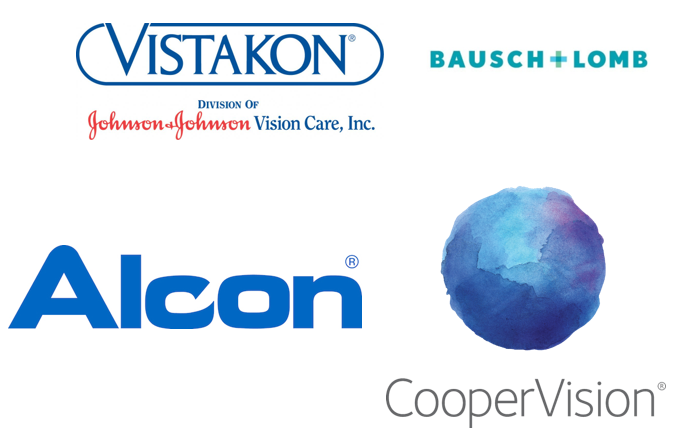
Contact lenses are medical devices. All contact lenses require a prescription and must be properly fitted and prescribed by an eye care specialist yearly. The yearly eye examination is needed to determine whether the cornea is healthy enough to continue wearing the contact lenses as well as verify the prescription is correct.
Improper use, wearing unclean/unsterilized lens or lenses can cause permanent eye damage or result in vision loss. These risks are significantly higher in patients who elect to wear lenses on continuous overnight or extended basis, for those who do not follow proper lens cleaning regimes as prescribed and those that do not throw away lenses as prescribed.
Soft vs Hard Contact Lenses
Soft lenses are made out of a flexible plastic that is combined with water and other chemicals to allow oxygen to flow through the contact lens and to the cornea. This increases comfort and helps maintain corneal health. Soft contact lenses are very easy to apply and remove. This type of contact lens stays in place and is easier to adjust to than hard lenses. Soft lenses are disposable and there are varieties available that can be worn from one day to one month (removing them nightly) before discarded.
Hard Contact lenses: Rigid Gas Permeable lenses allow more flexibility and oxygen to pass through the lens to the cornea, while maintaining their shape on the cornea. Initial comfort is the only area where soft lenses excel over hard lenses. Once the patient is use to them, they are extremely durable, easy to care for, offer clear, crisp vision and can correct all types of refractive errors and most corneal irregularities.
These options are available for both soft and hard contact lenses.
- Single Vision: The contact corrects both eyes for one distance of focus. This option comes in daily disposable, biweekly and monthly options.
- Toric/Astigmatism: This contact corrects the eye’s astigmatism over 0.75 cylinder.
- Monovision: One eye is corrected for distance and one for near/intermediate (computer/cell phone range). This is an option for patient with presbyopia.
- Multifocal lenses: These lenses correct both the distance and near vision for people with presbyopia.
Specialty Fit Contact Lenses
Any patient who is unhappy with their vision out of soft or hard lenses, have corneal irregularities or need other options to correct their vision are eligible for specialty contact lenses. Included is a brief description of the different types:
Hybrid Lenses: A hard contact lens with a soft lens edge. These lenses provide crisp vision out of the hard lens while maintaining the comfort of a soft lens. Hybrid lenses are very beneficial for patients with high myopia, high astigmatism, presbyopia with astigmatism, and irregular corneas.
Scleral Lenses: A large hard contact lens that ranges in size between 16 mm and 20mm, which covers a larger area of the eye than the iris. These lenses are used in cases of irregular corneas, post refractive surgery, or severe dry eye.
OrthoKeratology/Corneal Refractive Therapy: The fitting of specially designed gas permeable contact lenses that are worn while asleep. These lenses reshape the cornea to reduce myopia and astigmatism.
If you currently wear, or are interested in seeing if you are eligible to wear contact lenses, Contact Magruder Eye Institute today to schedule an appointment with one of our Optometrists for a contact lens evaluation.










